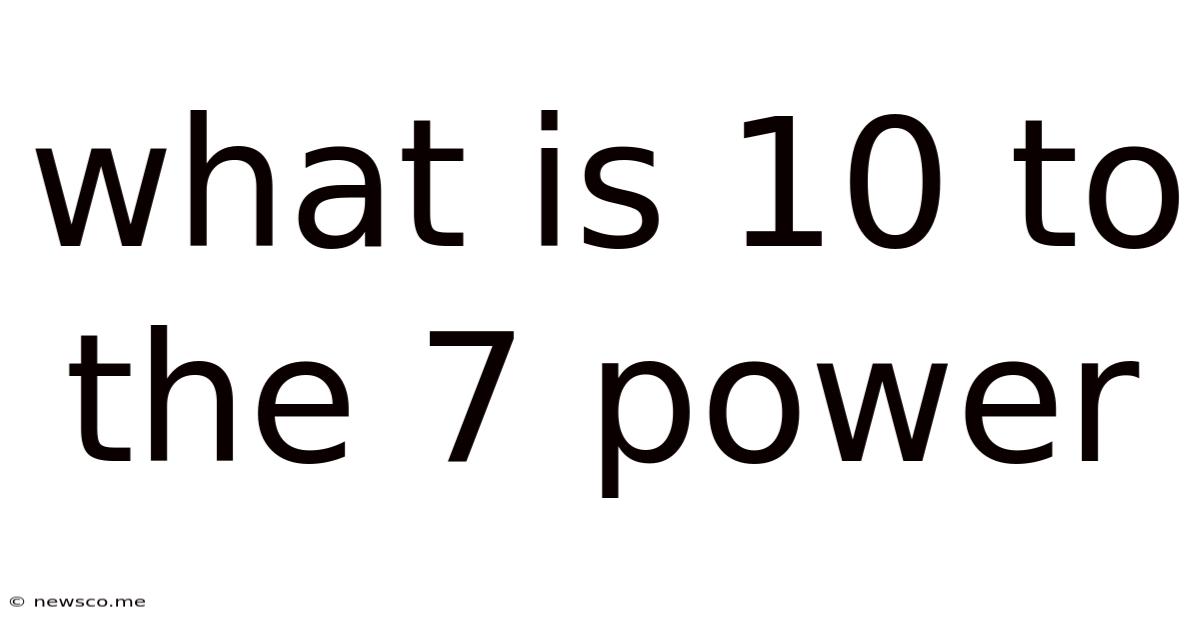What Is 10 To The 7 Power
News Co
Apr 21, 2025 · 4 min read

Table of Contents
What is 10 to the 7th Power? Unlocking the Secrets of Exponential Notation
Understanding exponential notation, or powers, is fundamental to grasping many scientific, mathematical, and even everyday concepts. This article delves deep into the meaning of 10 to the 7th power (10<sup>7</sup>), exploring its calculation, real-world applications, and its significance within the broader context of exponents. We’ll also touch upon related concepts and how to easily calculate similar exponential expressions.
Deciphering 10 to the 7th Power: A Simple Explanation
At its core, 10 to the 7th power, written as 10<sup>7</sup>, signifies multiplying the number 10 by itself seven times. This can be expressed as:
10 x 10 x 10 x 10 x 10 x 10 x 10
Performing this multiplication yields the answer:
10,000,000 (Ten million)
Therefore, 10<sup>7</sup> is equal to ten million. This seemingly simple calculation has profound implications across numerous fields.
The Significance of Exponential Notation
Exponential notation offers a concise and efficient way to represent very large or very small numbers. Imagine trying to write out 10<sup>20</sup> in standard form – it would be a number with 21 digits! Exponential notation provides a much more manageable way to handle these magnitudes. This is particularly useful in:
1. Scientific Notation
Scientific notation relies heavily on exponential notation to express extremely large or small values found in science and engineering. For instance, the distance to the sun is approximately 1.5 x 10<sup>8</sup> kilometers. Using standard notation would be cumbersome and less clear. Scientific notation makes these vast figures easier to comprehend and manipulate mathematically.
2. Computing and Data Storage
The capacity of computer storage devices (hard drives, SSDs) is frequently measured in gigabytes (GB), terabytes (TB), petabytes (PB), and beyond. These units are directly related to powers of 10:
- 1 Gigabyte (GB) = 10<sup>9</sup> bytes
- 1 Terabyte (TB) = 10<sup>12</sup> bytes
- 1 Petabyte (PB) = 10<sup>15</sup> bytes
Understanding powers of 10 allows for a quick grasp of the immense data storage capabilities of modern technology.
3. Financial Modeling and Compound Interest
In finance, exponential growth is a crucial concept. Compound interest, where interest earned is added to the principal, resulting in exponential growth over time, is often expressed using exponential functions. Understanding exponential notation is essential for comprehending and predicting financial growth.
4. Understanding Large-Scale Phenomena
Many natural phenomena involve numbers with extremely high magnitudes. For example, the number of stars in a galaxy, the number of cells in the human body, or the size of the universe are all best represented using exponential notation.
Exploring Related Exponential Concepts
To fully grasp the significance of 10<sup>7</sup>, it's beneficial to understand related concepts:
1. Powers of 10
Powers of 10 follow a consistent pattern: each increment in the exponent adds another zero to the number.
- 10<sup>1</sup> = 10
- 10<sup>2</sup> = 100
- 10<sup>3</sup> = 1000
- 10<sup>4</sup> = 10,000
- and so on...
This pattern makes it easy to visualize and understand the magnitude represented by different powers of 10.
2. Negative Exponents
Negative exponents represent reciprocals. For instance:
10<sup>-7</sup> = 1/10<sup>7</sup> = 0.0000001
Negative powers of 10 are used to represent extremely small numbers in scientific notation.
3. Exponents with Different Bases
While we've focused on 10<sup>7</sup>, exponential notation applies to any base. For example, 2<sup>7</sup> (2 to the 7th power) would be calculated as 2 x 2 x 2 x 2 x 2 x 2 x 2 = 128. The principles remain the same: the base is multiplied by itself the number of times indicated by the exponent.
Real-World Applications of 10<sup>7</sup>
Ten million (10<sup>7</sup>) appears in various real-world scenarios:
- Population sizes: Some smaller countries or large cities may have populations around 10 million.
- Financial transactions: Large financial institutions may process millions of transactions daily.
- Data storage: A significant portion of a large organization's data storage could easily reach 10 million files or more.
- Scientific measurements: Certain astronomical distances or physical quantities could be in the order of ten million units.
Mastering Exponential Calculations
While calculators easily handle these calculations, understanding the underlying principles is crucial. For larger exponents, logarithmic scales are often used for easier representation and manipulation of data.
Conclusion: The Power of Understanding Exponents
10<sup>7</sup>, representing ten million, is more than just a numerical value; it's a gateway to understanding exponential notation and its far-reaching applications. From scientific discoveries to financial models, exponential notation provides a concise and efficient means of handling large and small numbers, contributing significantly to our comprehension of the world around us. Mastering this concept opens doors to a deeper understanding of mathematics, science, and technology. By grasping the basics, you'll be better equipped to analyze data, interpret scientific findings, and navigate the complexities of the modern world. Remember the core principle: an exponent indicates repeated multiplication of the base number. Practice makes perfect, so continue exploring different exponential expressions to solidify your understanding.
Latest Posts
Related Post
Thank you for visiting our website which covers about What Is 10 To The 7 Power . We hope the information provided has been useful to you. Feel free to contact us if you have any questions or need further assistance. See you next time and don't miss to bookmark.